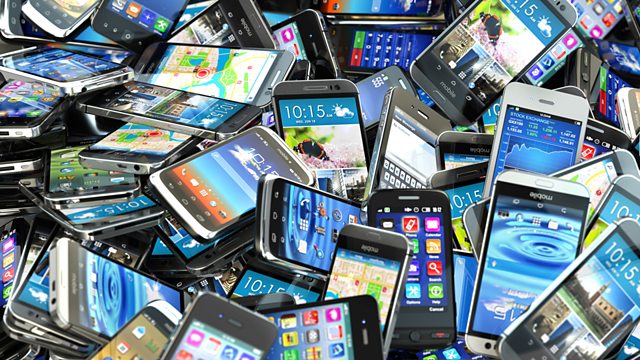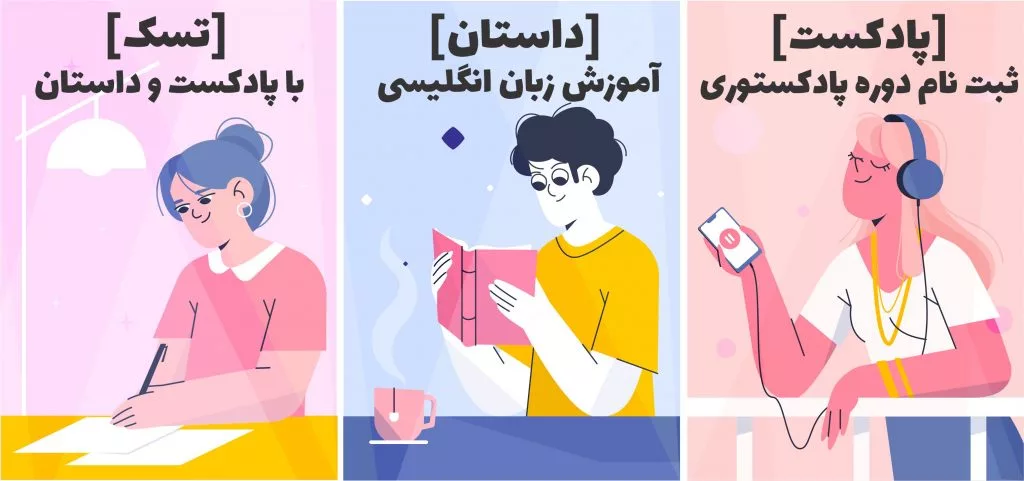پادکست انگلیسی BBC – تلفن همراه
در پادکست انگلیسی BBC – تلفن همراه ، درباره گوشیهای تلفن همراه و ترفندهایی برای خرید دوباره شما صحبت میشه. تولیدکنندگان تلفن همراه هر چقدر که میگذره طوری محصولاتشون رو درست میکنن که امکان تعمیرات در صورت ضربهخوردگیهای فیزیکی کمتر و گرانتر بشه. دلیلش هم واضحه اونا علاقهمندن که شما محصولات جدیدشون روهم بخرید.
سوال پادکست انگلیسی BBC – تلفن همراه:
How much electronic waste is thrown away every year globally?
a) 420 tonnes
b) 4.2 million tonnes
c) 42 million tonnes
به پادکست خوب گوش کن تا جواب رو پیدا کنی.
اگر می خوای گوش دادن به پادکست تا حد امکان برات ساده و کارآمد باشه مراحل زیر را دنبال کن:
هر روز به پادکست گوش کن. وقتی براش یه وقت ثابت در روز در نظر بگیری برات تبدیل به عادت میشه و این عادت هرروز پیشرفت میکنه.
پادکستی رو پیدا کن که موضوعش برات جالب باشه. وقتی از خود موضوع لذت ببری یادگیری هم برات لذتبخش میشه.
به پادکستی گوش کن که transcript یا متن داره. این بهت کمک می کنه تا کلمات و عبارات جدید رو به سرعت در متن پیدا کنی و ساختار انواع مختلف جمله رو خوب یاد بگیری.
پس از گوش دادن به پادکست با متن، در مرحله بعدی سعی کن بدون نگاه کردن به متن این کار رو انجام بدی. این کار مهارت شنیداری رو تقویت می کنه و کمک می کنه تا انگلیسی زبانان بومی را راحت تر درک کنی، حتی اگر خیلی سریع صحبت کنن.
اگه به پادکست انگلیسی گوش کردی و نتونستی کامل متوجه اش بشی، ناامید نشو. پادکست هایESL -English as Second Language بیشماری وجود دارن که برای سطوح مختلف، از ابتدایی تا پیشرفته طراحی شدن. مطمئنا هر روز می تونین یه پادکست مناسب با سطح خودت پیدا کنی.
فراموش نکن که هرچی بیشتر تمرین کنی در اون مهارت رشد میکنی! به قول انگلیسی ها: Practice makes perfect
واژگان کلیدی پادکست انگلیسی BBC - تلفن همراه
| معنی به فارسی | معنی به انگلیسی | واژه |
| یک قطعه کوچک یا به عبارت دیگر یک ابزار نامیده میشه | a small piece of technology – otherwise called a gadget | gizmo |
| پایدار | able to continue over a long period of time (or able to continue without causing harm) | sustainable |
| پیچ کردن | to join together using a screw: a nail with twisting raised edges | to screw |
| کاهش انتظارات خود | to reduce your belief something good will happen | to lower your expectations |
| منسوخ | no longer used, out of date | obsolete |
| جامعه ای را توصیف می کند که در آن مردم خیلی راحت چیزها را دور میاندازند | describes a society in which people throw things out very easily | throwaway culture |
BBC 6 minute English -Built to fail?

برای دانلود پادکست روی سه نقطه سمت راست کلیک و گزینه Download را انتخاب کنید.
متنپادکست انگلیسی BBC - تلفن همراه
Neil
Welcome to 6 Minute English, where we bring you an interesting topic and six items of vocabulary.
Catherine
And all in just six minutes, of course. I'm Catherine.
Neil
And I'm Neil. Today – is technology built to fail? And are we throwing away too much technology and harming the planet? Catherine, tell me - how old is your TV?
Catherine
My TV has just had its fifth birthday.
Neil
And your mobile phone?
Catherine
It's about two and a half.
Neil
So you do like to have gizmos, but not necessarily the latest.
Catherine
Exactly.
Neil
Gizmo – nice word. A gizmo is a small piece of technology – otherwise called a gadget.
Catherine
And of course I'm not alone in buying gadgets from time to time. They actually keep on getting more advanced – so people keep buying new ones.
Neil
Technology also gets cheaper and cheaper. In fact, many gadgets are more expensive to fix than replace.
Catherine
And this means that we throw a lot of gadgets away – but how many?
Neil
See if you can guess: how much electronic waste is thrown away every year globally? Is it…
a) 420 tonnes,
b) 4.2 million tonnes or
c) 42 million tonnes?
Catherine
And I do actually know the answer to this once, so I'm gonna keep quiet, just for once!
Neil
Ah, first time for everything! So, to bring us back to our main point. Is technology no longer built to last? Let's hear first from Professor Tim Cooper who is an expert in sustainable consumption and production at Nottingham Trent University in the UK.
Catherine
Sustainable, by the way, means 'able to continue over a long period of time'. We often use it to mean 'able to continue without causing harm' – like environmental damage. What's the problem with mobile phones?
INSERT
Tim Cooper, Professor of Sustainable Consumption and Production at Nottingham Trent University
The classic example of this is the mobile phone, where, for example, screens are glued into the product. Now they know that if there was a screw there, the consumer could easily, when that screen cracks, which is obviously a very common problem with mobile phones, unscrew it and put a new screen on. They don't. They know perfectly well that that would be a way in which mobile phones would last longer. They don't want that, they want you to replace your mobile phone every year or two.
Neil
Professor Cooper says that mobile phones' screens crack often – and generally when that happens people buy a new one.
Catherine
That's partly because mobile phones' screens are glued on rather than screwed on. Now a screw is a piece of metal like a nail but with a raised twisted part – and we use screws to join two things together.
Neil
The verb form is the same – to screw – and the opposite is to unscrew. If you could unscrew a cracked screen and then replace it, there'd be no need to buy a whole new phone, he says.
Catherine
He thinks that generally, people have lowered their expectations when it comes to how long things should last.
Neil
Expectations is a good word – an expectation is a strong belief something will happen. Expectations can be raised or lowered.
Catherine
Or managed – to 'manage your expectations' means to not let your expectations get so high that you then become disappointed when something fails.
Neil
Yes, by way of an example, Professor Cooper says that his parents' washing machine lasted for 37 years. These days, they last between five and ten.
Catherine
Yeah. And we don't see electrical products as an investment in the same way that people used to. We now worry that what we buy today will become obsolete tomorrow.
Neil
Obsolete – no longer valid or useful. And also – he says we've become so used to cheap products that we don't want to spend more on good quality.
Catherine
So what's to be done?
Neil
Cooper suggests that if we can afford it, we really should try to buy higher quality products. And manufacturers should put labels on their products saying how long they are designed to last.
Catherine
An interesting idea. Cooper says that over 2m pounds worth of electrical goods are thrown away each year in the UK. He calls it a "throwaway culture".
Neil
A culture in which we throw things out much more easily. Not good for the planet either. So – will you try to keep your mobile for a bit longer, or are you already tempted by the latest model, Catherine?
Catherine
I'm happy with the one I've got, but I'm gonna protect the screen very carefully.
Neil
Yes, a good idea. Maybe this will help you make up your mind, though. I asked how many tonnes of electrical waste are thrown away globally.
Catherine
And I said I know the answer – it's actually 42m tonnes, according to a UN report back in 2015. The figure could be a lot higher now. And as you know – my mobile isn't very heavy – so 42m tonnes is an awful lot of phones! While we try to picture that, let's quickly run through today's vocabulary. So first up was gizmo - a small piece of technology – a gadget.
Neil
Smartphones, smart watches, fitness trackers, sat navs – all gizmos!
Catherine
We had sustainable – able to last or continue. We talk about sustainable energy, sustainable economic development…
Neil
The opposite would be unsustainable development… And another pair of words – to screw and to unscrew.
Catherine
A screw is that little metal thing like a nail that we use to join things together. You can screw shelves into the wall, you can screw furniture together…
Neil
And when you move house you unscrew it. Three more: to lower your expectations. What have you lowered your expectations about?
Catherine
Err, so many things… Becoming a millionaire - I don't think that's going to happen. Or I could say a company has lowered its expectations about performance over the next five years.
Neil
Yes – another one looking ahead into the future – I'm pretty sure my computer will be obsolete in ten years. It will no longer be used – it will be out of date.
Catherine
I just urge you, Neil, when you do get a new one – please recycle this one responsibly. We already live in a throwaway culture.
Neil
Yes – it's pretty unsustainable. Now, before your laptop or phone becomes obsolete – I suggest you check out our Facebook, Twitter, Instagram and YouTube pages! Bye for now.
Catherine
Bye!
امیدوارم از پادکست انگلیسی BBC - تلفن همراه در آب لذت برده باشید.
گوش دادن به پادکست روش خوبی برای تقویت مهارت شنیداری و هم چنین یادگرفتن کلمات در بستر یک موضوع خاصه که این به تقویت مهارت مکالمه انگلیسی نیز کمک زیادی می کنه.
اگه تو هم از اون آدمهایی هستی که از گوش دادن به پادکست لذت می بره برات یه خبر خوب دارم! آموزشگاه زبان انگلیسی 24talk یه دوره طراحی کرده مبتنی بر پادکست و داستان کوتاه به اسم "پادکستوری - Podcastory". این دوره سعی کرده یادگیری زبان انگلیسی رو مناسب با نیاز و سطح زبان آموز به یه فرایند بسیار مفرح، موثر، سریع و کم هزینه تبدیل کنه.
همین الان می تونی با کلیک روی عکس زیر و ثبت نام در دوره ی آموزش زبان انگلیسی با پادکست و داستان ۲۴talk اولین و مهم ترین قدم رو برای یادگیری زبان انگلیسی برداری. وقت رو از دست نده!
دوره پادکستوری آکادمی مجازی 24talk
برای شنیدن دیگر پادکست ها، به بخش پادکست در مرکز آموزش رایگان مراجعه نمایید.









